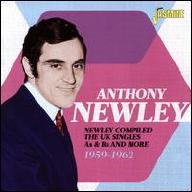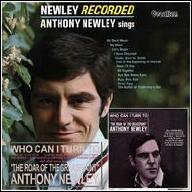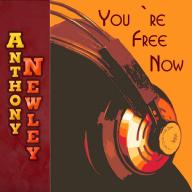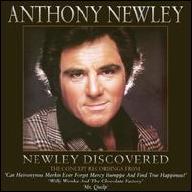He was born Anthony George Newley on September 24, 1931, the son of George Anthony and Frances Grace Newley, in Hackney, a working-class section of London. Neither of his parents was involved in performing or music, and it was only a sequence of events growing out of World War II that led him toward either of those fields. Newley's education was interrupted by the German blitz, and he was evacuated to a foster home in the countryside. Along with some friends, he eventually found his way to Brighton and the home of George Pescud, a retired music hall performer who introduced Newley to performing, singing with him in the local choir and performing skits. Pescud opened up Newley and his friends to a range of arts, including music, writing, and painting, that he might otherwise never have appreciated or understood.
Newley, who was not yet 14 at the conclusion of the war, decided to remain on his own rather than return to the home of his mother (his parents having divorced in the '30s), and bounced between jobs before setting his sights on studying acting. Unable to pay for his education at the acting school for which he auditioned, he worked at the school as an office boy, intending to work his way through. After only three weeks, however, Newley was spotted by a movie director named Geoffrey de Barkus, who was in the process of preparing a film called #The Adventures of Dusty Bates, and recruited the boy for the title role.
Newley was scarcely a skilled actor, but he photographed extremely well and when playing roles that weren't too challenging, seemed natural. He also got better as he went along from role to role over the next few years. In 1948, he was cast in the best of his boyhood parts when David Lean chose Newley to play the Artful Dodger in his screen adaptation of +Oliver Twist. One of the most ambitious and controversial screen versions of a literary classic, #Oliver Twist didn't open in America for three years, owing to distributors' objections to Sir Alec Guinness' portrayal of Fagin, but it was still a career maker for many in the cast. Newley was one of the best things in this brilliant film, with several great scenes and a superb performance in the film's denouement.
Newley arrived as an actor just at the point when he was called up into the Army in 1949, but he was unable to adjust psychologically to the requirements of military service. On the recommendation of an Army psychiatrist, he was released in 1950. He picked up his screen career right where he left off with a string of well-made British films, including #The Golden Salamander, #Above Us the Waves, #Cockleshell Heroes, and #X the Unknown, running the gamut from wartime re-enactments to science fiction thrillers. During 1956, Newley joined the cast of an experimental four-person show called #Cranks, written by John Cranko and John Addison, which was sufficiently popular enough in London to get transplanted to Broadway. It was poorly received by New York critics, except for Newley, who played multiple roles and got an excellent notice from Brooks Atkinson in the New York Times.
Newley was back in movies after the closing of #Cranks, and one of his more unusual film appearances at the end of the '50s was in #Idle on Parade. The British picture was loosely inspired by Elvis Presley having been drafted and was about a rock roll singer named Jeep Jones, who is called up for military service. The film also yielded Newley's first chart-topping hit, I've Waited So Long, ironically a rock roll-style number. That single opened up a recording career for Newley, as well as a series of appearances as a singer on the music hall stage and on British television. Between 1959 and 1961, Newley charted seven more Top Ten British hits in the pop/rock vein, including Personality and Pop Goes the Weasel, and a pair of number one singles, Why and Do You Mind.
By 1961, he had two LPs out and seemed to be following the route of every other English rock roll star (though, of course, he was older than any of his rivals in that field by nearly a decade), moving toward pop music on Love Is a Now and Then Thing and Tony. Newley's experience in #Cranks, however, had whetted his appetite to do something new and serious in music and theater. His opportunity came in 1961 -- partly as an outgrowth of his chart success, which made Newley less of a risk in such a venture -- when he was invited to devise his own stage production. He teamed up with an acquaintance, Leslie Bricusse, who brought Newley to New York (where Bricusse was already scheduled to work on a new show for Beatrice Lillie) and in a month-long burst of creative activity, they devised +Stop the World -- I Want to Get Off. A mix of songs, dance, pantomime, and dialogue, it was a satirical look at the seven ages of man that became a huge hit on London's West End when it opened on July 21, 1961, starring and directed by Anthony Newley. It also yielded three hit songs, What Kind of Fool Am I, Once in a Lifetime, and Gonna Build a Mountain.
The show opened in New York 15 months later with Newley in the lead; it ended up running nearly two years, including a national tour for Newley. When he returned to England, he and Bricusse were one of the hottest songwriting teams in music, and among their subsequent hits was the title song to #Goldfinger. Newley and his second wife, Joan Collins, in collaboration with Bricusse, also wrote and recorded a hit musical comedy album, Fool Brittania, inspired by the Profumo scandal that had shaken the British government to its roots. Newley also starred in a film, #The Small World of Sammy Lee, an expanded version of a theatrical work that he'd done on-stage in 1958.
Several film projects for Newley as star and director (including a version of #Stop the World that ended up directed by someone else) were announced during this period but never made. Instead, in 1965 he and Bricusse returned to the stage with +The Roar of the Greasepaint -- The Smell of the Crowd. The British production, starring Norman Wisdom, was never successful, but the American production starring Newley himself, with Cyril Ritchard, enjoyed extended previews and a six-month run on Broadway. It yielded a successful cast album and several of the musical's songs were later covered by a wide range of pop artists.
By that time, Newley announced that he had tired of musical theater and turned to other media, most notably film. He was cast in and co-authored the score for the 1967 musical +Doctor Doolittle, starring Rex Harrison, which was a notorious flop (nearly sinking Fox, the studio that produced it). Two years later, he directed and starred in the semi-autobiographical film #Can Hieronymus Merkin Ever Forget Mercy Humppe and Find True Happiness?, which became a failure of huge proportions. Then in 1971, he and Bricusse teamed up again to write the score for the musical #Willy Wonka the Chocolate Factory, which was a box office success and yielded an early '70s pop standard in the guise of The Candy Man, which was a hit single for Sammy Davis, Jr.
That same year, Newley and Bricusse wrote songs for an NBC television version of +Peter Pan. In 1972, Newley and Bricusse collaborated on one final stage work, +The Good Old Bad Old Days, which was a modest success. Newley's career stalled from the mid-'70s on in terms of new triumphs. He did films, including #It Seemed Like a Good Idea at the Time, but they made very little impression; the Sammy Davis, Jr. adaptation of #Stop the World -- I Want to Get Off, filmed as #Sammy Stops the World, was a failure as well.
Newley's last new collection of material was the 1978 album The Singer and His Songs. He worked as an actor in small parts on projects such as the PBS production of #Alice in Wonderland in 1982, but Newley was otherwise not very visible. By the '90s, he was in his sixties and one of the deans of English musical theater, moving into character roles and taking on new projects. A resident of California since the '70s, he returned to England as well, assembling a revue of his original music, called Once Upon a Song. He also played the title role in the Leslie Bricusse musical version of +Scrooge, and occasionally returned to cabaret performance.
Little-known to the outside world, Newley had contracted cancer, which he battled for years between and around these performing ventures. He died of cancer at his home in Jensen Beach, FL, on April 14, 1999. In the time since his passing, Newley's music and especially his records from the '60s have acquired a new generation of listeners in England, and his albums are much sought after, following years of languishing in cut-out and bargain bins. ~ Bruce Eder, Rovi


















